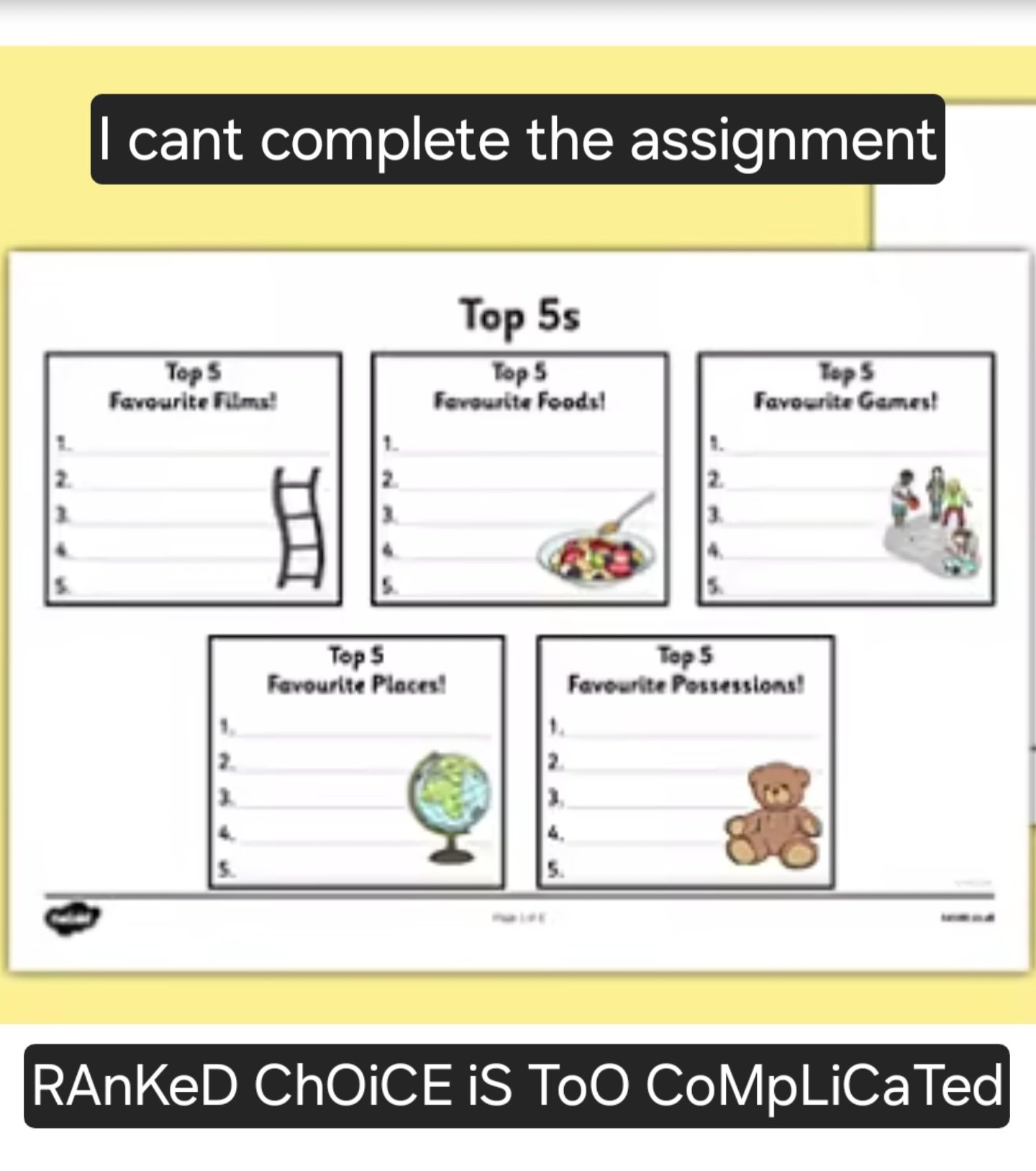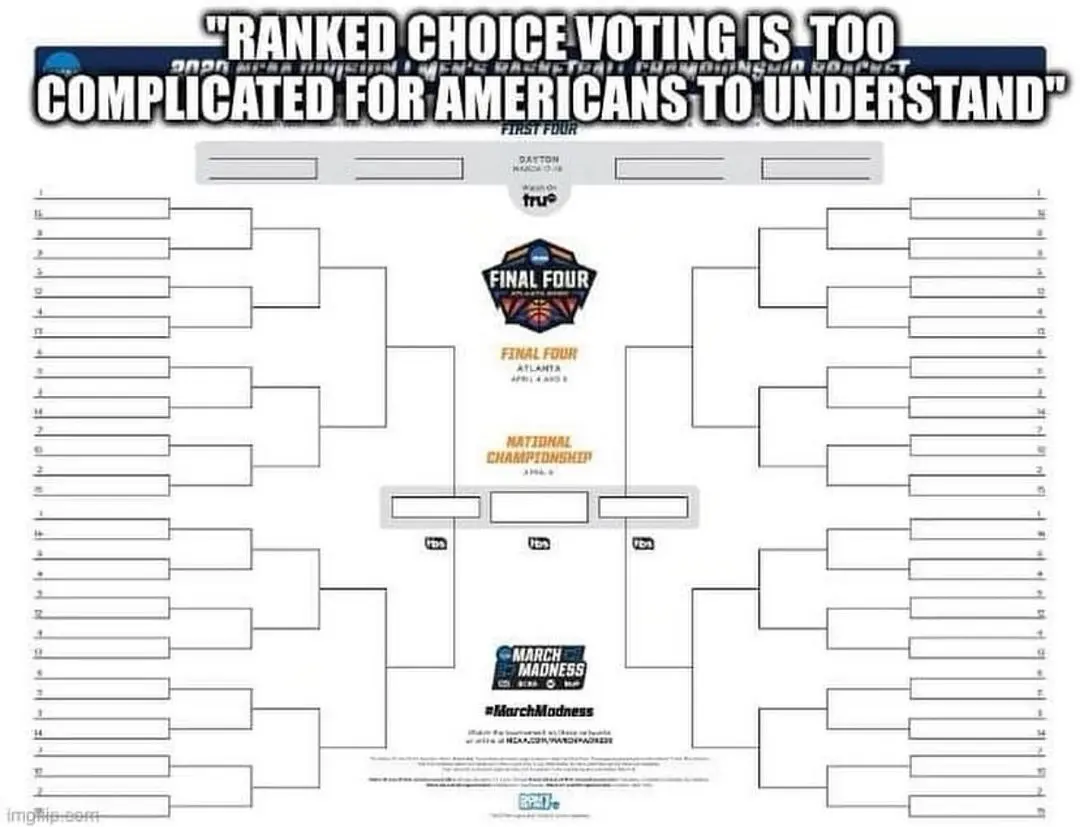How is ranked choice voting like a March Madness bracket? I thought ranked choice voting was where you rank candidates based on preference. A bracket is basically a series of binomial choices and would be closer to the system we have now.
level of complexity
My thinking also. Not that I think ranked choice is overly complex, mind, and I would welcome it over a first past the post system. But the March Madness bracket is easily less complex to my mind, so doesn’t really get the point across well.
Ranked choice voting negatively impacts only those who benefit from the narrative that people are stupid, to be force-fed their policies and their infotainment.
March Madness is more comparable to condorcet only you’re not voting every possible matchup
How about choosing a sport that actually uses ranked choice to determine winners?
https://www.nascar.com/news-media/2019/02/08/nascar-driver-points-awarded-per-race/

Edit: but here, let me tell you who should run the country.
Has ranked choice voting been implemented elsewhere and been shown to increase the quality of candidates?
Ranked-choice voting has been implemented elsewhere. It reduces the incidence of ‘strategic voting’, where voters see that their preferred candidate is non-viable, and so vote for a candidate that they dislike (but less than the other leading candidate).
The point isn’t ‘quality of candidates’, which is highly subjective, but to more accurately reflect the will of the voters.
As an Irish person, we have ranked choice single transferrable voting, one big benefit I see is that people can vote for less popular candidates that they closely align with without throwing away their vote, since when the candidate is eliminated your vote is transferred to your next choice.
One other thing that I thinks is very important is proportional representation, which means that for a given constituency, instead of a single candidate being chosen multiple are, for example is my constituency we have 5 Teach Dáile (members of our Dáil/parliament) This means that less popular candidates will have a real chance of getting a seat. It also means that more of the population is represented, for example in my constituency each candidate would get on average about 15%+ of the vote, meaning that 75%+ of the voting population are represented, unlike the 40% or so that a two party system usually has
And it’s not confusing, we’re thought how it works in school and voting is the easy part, counting us more tricky, but is understandable when properly explained
Omg, good point about proportions representation! I live in Tennessee where democrats have 1 out of 9 house seats. That’s 11% represention for democrats and 89% for republicans. And that isn’t counting the 2 republican senators.
According to Pew research, republicans make up 48% of TN and democrats are 36% (15% no lean). But the 48% has drawn the lines so they get 89% of the representation.
It is infuriating!
Somebody else mentioned Ireland too, maybe that should be the model.
I’d argue that you don’t really need empirical data for that, since game theory already proves that’s the case.
I don’t disagree at all, but if you want to actually change things, actual examples are way more convincing than a logical proof with no data.
and the bible “proves” god exists
Completely different categories, homie. Also, the bible doesn’t even claim to do so.
then your categories are too small. both are modes of thought
The Bible is a mode of thought? O.o Also, again: the bible never claims to prove god.
Also, game theory is a scientific field with provable theorems and theses. Not the same cathegory as a religious text.
Don’t most political parties across the world use some form of ranked choice for internal elections within their parties?
Makes sense that they’d want the best consensus amongst themselves, but not for us, the people they “represent”
Ireland :)
So, is the solution to rebrand ranked choice to bracket voting? Make politics “fun”?
Not really serious, probably end with another meme president
its questioning the presumption of people who play far more complex games being unable to understand voting
Liberals will never understand that the establishment including Democrats will ban anything using any outrageous excuse as soon as their power monopoly becomes endangered.
I know sports, therefore i’m very smart.
What lol
Pictured is a popular bracket amongst American sports fans, where they fill out predictions for winning teams, each time the matchup winnowing down the remaining teams by removing the loser.
This isn’t really much different than ranked-choice voting, except that ‘preference’ rather than ‘prediction’ is used.
Despite this, some people insist that ranked choice voting couldn’t work in the US because it’s ‘too complex’ for American voters, many of whom yearly do this similar and much more expansive process for the sheer fun of it.
Is this related to the napovo interco?



